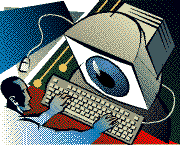

In July of 1995, Cybercop.org organized a panel of law enforcement witnesses and testified before Congress against the Communication Decency Act at a hearing before the House Science Technology and Basic Science Subcommittee. The other law enforcement members on the panel concurred that the CDA was not the solution to dealing with materials that are inappropriate for our children on the Internet. We can protect free speech *and* our children. Although this task is not impossible, it is a much more difficult to accomplish in a free society where speech viewed by many as offensive is often Constitutionally protected. The Cybercop statement submitted at the hearing included the Cybercop web page, making the Cybercop Web Page the first Web page to be included in the Congressional Record.
Subsequent to that hearing, a three judge panel ruled that the CDA suffered from Constitutional infirmities. On appeal, the United States Supreme Court agreed.
During our panel's testimony, the audience chuckled at a comment by a panelist who suggested that one solution to protecting our children was for parents to "take Johnny's computer out of the bedroom and place it in the living room". Funny, yet so true. The traditional time-tried concept of parental guidance and supervision is one of the solutions. Although parents must not abdicate their responsibilities to the government, they do need all the help they can get in dealing with stalkers, pedophiles, con artists and the other dangerous riffraff that populate the Net alongside uplifting and educational sites like the Smithsonian, Disney, PBS and National Geographic.
Thanks to Dr. Fred Cohen of Fred Cohen and Associates, Cybercop.org continues to have a home for its web page here on http://all.net. Dr. Cohen, a pioneer in every sense of the word in the field of computer security, has provided invaluable assistance in the training of cybercops in collaboration with training programs conducted by the Federal Law Enforcement Training Center, as well as in programs conducted by the Federal Computer Investigative Committee and the High Tech Crime Investigative Association http://www.htcia.org
Over the past 20 years or so, Fred has been involved in some of the most innovative work in the computer security field (his doctoral thesis in the mid 80's represents the seminal work on computer viruses). In addition to serving as principle of Fred Cohen and Associates, he is also a principle member of technical staff at Sandia National Laboratories, where he is now working with a group of college students called the "college anti-crackers"
His web site has an unparalleled collection of catalogued computer security attack and defense resources and even an interesting game called "Do you want to play a game" which includes the "cracker game".
Those interested in the field of policing on the electronic frontier as a profession should also inquire about the certificate programs offered in the areas of computer forensics and security by the University of New Haven (with programs conducted in New haven, Connecticut and Sacramento, California). I would be glad to provide information to interested persons about these ground breaking programs.
In a virtual seminar on the WELL panelist Bruce Sterling once commented that on the Net, cybercops are like shy woodland creatures. Our CFP panel flushed some of them out of the forest and into the public debate. Many Netizens want to know just who these people are and what do they want to do to (and on) the(ir) Net? The concept of "community policing" on the Net is going to have to begin with a dialog with these folks about plans and intentions.
The Cybercop led workshop served as a round table platform for the many divergent views of just what role cybercops should have on the Net. Joining the panel were:
Author/journalist Bruce Sterling, Professor Dorothy Denning, "unindicted cryptographer" Phil Zimmerman, Computer security consultant and former head of the FBI's Computer Crime Squad, Jim Settle, and New Jersey Cybercop Mike Geraghty.
That was my first CFP. The aggregation of Congresspersons, Federal Judges, hackers, cops, weenies, nerds, lawyers and journalists was one of the most improbable I have ever encountered. It was also the most enlightening and fascinating conference I have ever attended. CFP must be one of the Seven Wonders of the Electronic Frontier. It was like someone poured out all of the heavy duty players from The Hacker Crackdown into a single venue. . . and they actually talked (and more importantly frequently listened) to each other. Thanks to a sympathetic Hal Abelson (who hacked me into the EFF awards dinner) and MCI for comping' the fees for law enforcement to attend the tutorials, I was able to attend most of the conference after emptying my wallet to pay for the car fire that immolated my 10 year old Toyota on the interstate on the way to catch a plane to the conference.
CFP 97 saw an expanded Cybercop / Cypherpunk panel thanks to a chance meeting I had with Cypherpunk pioneer Dave Del Torto. That panel included the likes of Cypherpunks John Gilmore, Phil Zimmerman, Sameer Parekh, Hugh Daniel, as well as cybercop reps Howard Schmidt (then Air Force OSI, now head of global information security for Microsoft), Peter Toren (then on the DOJ Computer Crime Section staff) and Ray Humphrey (Chief of security for Digital).
I've included some pics from CFP96 below. Bruce Koball interviews Steve Mann (of MIT MediaLab Wearcam fame). The "Unarrested and Unindicted" includes Phil Zimmerman (the "Unindicted") and Kevin Mitnick's separated-at-birth look alike, Lee Neusbaum, who agreed to have his picture taken with Jim Settle, who took him into custody at CFP94. Last there is Bruce Sterling , who wrote the Hacker Crackdown, caught refueling before takeoff in a saloon near MIT. . .
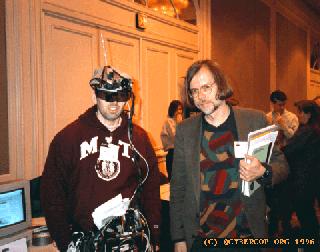
Steve Mann ("Wearcam") and Bruce Koball
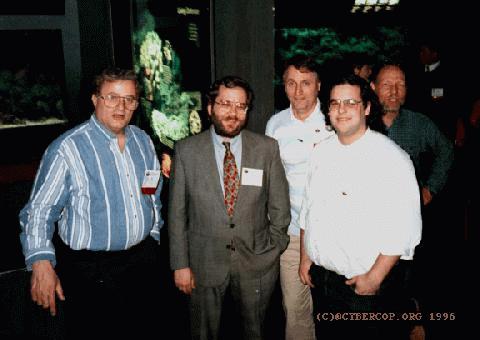
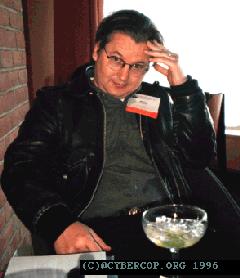
In the early 90's I developed the first BBS and pioneered Internet training at the Federal Law Enforcement Training Center (FLETC), where I serve as a Senior Instructor in the Financial Fraud Institute. FLETC is located 70 miles north of Jacksonville, Florida on the Georgia coast.
Bruce Sterling wrote about FLETC in " his cyber-classic "The Hacker Crackdown...Law and Disorder on the Electronic Frontier" and the Center was featured in a January 23, 1995 cover story in US News & World Report written by Senior Editor Vic Sussman.
In addition to serving as director of Cybercop.org, I also am a senior
instructor at the Financial Fraud Institute located at the Federal Law
Enforcement Training Center (US treasury Department), in Southeast Georgia
and am an adjunct professor at the University of New Haven. I been in law
enforcement for twenty years and have served in all three branches of government.
Click here for a short
bio
Dorothy Denning, professor of Computer Science at Georgetown, has written extensively on crypto subjects. When Dorothy was with Digital Equipment Corporation she wrote an interesting piece on the need to open a dialog with hackers. Shortly after the Cybercop web page went up in early 1995, Dorothy mailed me the June 11, 1995 "postscript" to that piece - with a different "take" on the subject. Dorothy maintains a home page at:
http://www.cs.georgetown.edu/~denning/
Public cryptography has become the proverbial "two edged sword" that concurrently serves as a talisman of freedom, anarchy, security, privacy and anonymity. Cryptography has become a defining "boundary issue" separating the hacker, civil libertarian and law enforcement communities. Phil Zimmerman, has become the point man (or lightening rod, depending on one's perspective) of public key cryptography which serves the public citizen and terrorist with equal facility.
Encrypted transmission of data representing value on the Net has become a critical vessel for the fuel of commerce. Digital cash is now a reality. Bruce Sterling once emailed a message to me about the thought piece: "Blacknet" which predicted a digital cash black market on the Net.
More recently we have seen the emergence of more elaborate anonymizing
schemes with an encryption overlay in the "Freedom Net" which deals with
the use of an "Onion Routing" type scheme utilizing servers that both encrypt
and anonymize traffic between participating servers, a sort of "Mixmaster
on Steroids".
http://www.zks.net
Without robust debate and communications about these kinds of issues, the essential element of trust of a community in its agents tasked with preserving safety and security on the Net cannot be created or maintained. To that end I have dedicated this Web site.
I owe much to a good friend and respected profiler and police futurist, Bill Tafoya, who was instrumental in moving the FBI's UNABOM investigation (Ted Kazinsky) on to the Net. Bill has retired from the Bureau and is a professor at Governor State University in Illinois.
I would also commend to you a Delphi study by Larry Coutorie, who is with the University of Texas System, which "attempts to forecast the future nature of high-technology crime"
Protecting children from "adult content" and predators on the Internet is one of the most important challenges for our nation and the Net community. Will workable solutions come from the Federal Government via legislative fiat or from empowered families assisted by concerned corporate America and community minded organizations?
The concerns of parents about adult content, pedophiles actively recruiting children and engaging in elaborate "sex tourism" operations on the Net are real. Concerned parents have a number of resources they can call on to help them to protect their children from harm. The National Center for Missing and Exploited Children http://www.ncmec.org
A number of federal agencies such as the US Customs Service, US Postal Service, FBI, as well as a number of State Attorney Generals' offices, state task forces, sherrif's offices and police departments have created investigative units to deal specifically with investigating crimes involving the exploitation of children online.
mailto:cybercop@mindspring.com
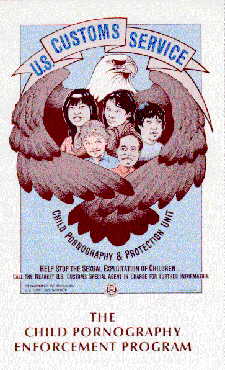
Thanks for dropping by. While you're here, I hope you'll hit that button at the top of your screen to add us to your bookmark list.
If you know of any sites on the Net which are promoting discussions or communications about the role of law enforcement on the electronic frontier, please let me know. I would very much appreciate hearing any of your comments or suggestions about how the challenges of freedom, privacy and security can best be addressed in free society and a networked world. Thanks. . .
Kevin Manson, Webmaster
Ubiquitous Disclaimer: "I own my own words" The views expressed here are solely my own. Although I communicate and speak regularly with many cybercops I do not presume to speak for them. . . or any organization other than Cybercop.org.